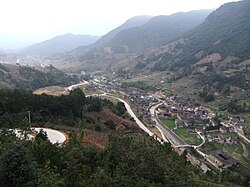Hukeng, Fujian
Appearance
Hukeng
湖坑鎮 | |
|---|---|
 Nanjiang Village, a section of the "Great Wall of Tulou" in the Nanxi Valley | |
| Coordinates: 24°39′00″N 116°57′00″E / 24.65000°N 116.95000°E | |
| Country | People's Republic of China |
| Province | Fujian |
| Prefecture-level city | Longyan |
| County | Yongding |
| Area | |
| • Total | 95 km2 (37 sq mi) |
| Population (1997) | |
| • Total | 24,000 |
| http://www.xzqh.org/html/2008/1217/9544.html | |
| Time zone | UTC+8 (China Standard) |
Hukeng (Chinese: 湖坑) is a town (a township-level division) situated in Yongding County, Longyan, Fujian, China.[1]
Hukeng town contains one of the Hakka settlements in China.[2] Moreover, a large number of Fujian Tulou are located with the territory administratively included within Hukeng, with a few within the actual Hukeng Town area. In particular, administratively, Hukeng includes the valley of the Nanxi (南溪, "South Creek"), where several villages (Yangduo, Xinnan, Nanzhong, Nanjiang, Shijia) consisting mostly of tulou form what some writers have dubbed the "Nanxi Great Wall of Tulou".
See also
References
Wikimedia Commons has media related to Hukeng.
- ^ "湖坑镇 (Hukeng Town)" (in Chinese). xzqh.org. Archived from the original on 2011-09-21. Retrieved 2012-05-24.
- ^ Lin, Hsiao Hsien; Chen, I.-Yun; Lu, Shih-Yun; Tseng, Yi-Han; Lin, Jao-Chuan (1 January 2022). "Can cultural tourism resources become a development feature helping rural areas to revitalize the local economy under the epidemic? An exploration of the perspective of attractiveness, satisfaction, and willingness by the revisit of Hakka cultural tourism". Open Geosciences. 14 (1): 590–606. doi:10.1515/geo-2022-0358. ISSN 2391-5447.

